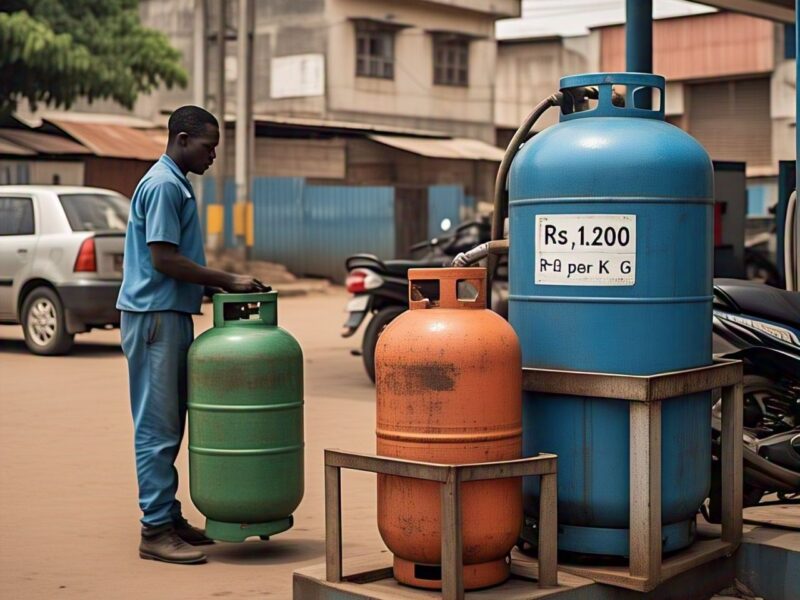Liquefied Petroleum Gas (LPG), commonly referred to as cooking gas, is a vital energy source for households and businesses across Nigeria. As of March 29, 2025, understanding the cost of gas per KG in Nigeria is essential for budgeting and planning, especially given the economic fluctuations impacting fuel prices. We’ve conducted an in-depth analysis of current pricing trends, regional variations, and influencing factors to provide you with a comprehensive guide on how much gas costs per kilogram in Nigeria today. This article offers detailed insights, practical buying tips, and a look into the future of LPG pricing in the country.
Table of Contents
ToggleCurrent Price of Gas Per KG in Nigeria
As of late March 2025, the price of gas per KG in Nigeria fluctuates based on location, supplier type, and market dynamics. Our research, spanning physical vendors, online platforms, and industry reports, reveals the following average costs:
- Urban Centers (Lagos, Abuja, Port Harcourt): Gas prices range from ₦1,000 to ₦1,200 per kilogram. For instance, at major filling stations like Oando in Lagos, prices hover around ₦1,100 per KG, while MRS stations offer it at approximately ₦900–₦1,000 per KG.
- Suburban and Rural Areas: Prices can climb to ₦1,300–₦1,500 per KG due to transportation costs and limited supply. In regions like Kano or Enugu, vendors often charge a premium for accessibility.
- Bulk Purchases: For larger cylinders (e.g., 25KG or 50KG), prices can drop to ₦900–₦1,050 per KG at depots or wholesale outlets like NIPCO.
These prices reflect a recent decline from earlier 2025 highs of ₦1,350–₦1,500 per KG, offering some relief to consumers. However, we note that costs remain dynamic, influenced by both local and global factors.
Factors Affecting Gas Prices Per KG in Nigeria
Several elements shape the cost of gas per KG in Nigeria. We’ve outlined the primary drivers below to help you understand why prices vary:
1. Global LPG Market Trends
Nigeria imports over 60% of its LPG, making it sensitive to international price shifts. We observe that a stabilization in global crude oil prices in early 2025 has contributed to the recent dip in domestic gas costs.
2. Exchange Rate Volatility
With the naira fluctuating against the dollar, import costs directly impact retail prices. A weaker naira increases the expense of imported LPG, while a stronger naira, as seen in March 2025, can lower prices.
3. Local Supply and Demand
Despite Nigeria’s vast natural gas reserves, domestic production remains insufficient. We find that high demand, especially in urban areas, often outstrips supply, pushing prices upward in peak seasons.
4. Transportation and Logistics
The cost of moving LPG from coastal depots to inland regions adds a significant markup. In rural areas, we see prices rise by ₦200–₦300 per KG due to these logistical challenges.
5. Government Policies
Recent interventions, such as the removal of VAT and import duties on LPG announced by the Ministry of Finance, have helped reduce costs. We expect further policy adjustments to influence future pricing.
Cost Breakdown by Cylinder Size
To give you a practical sense of expenses, we’ve calculated the cost of refilling common cylinder sizes based on an average price of ₦1,020–₦1,200 per KG:
- 3KG Cylinder: ₦3,060–₦3,600
- 5KG Cylinder: ₦5,100–₦6,000
- 6KG Cylinder: ₦6,120–₦7,200
- 12.5KG Cylinder: ₦12,750–₦15,000
- 25KG Cylinder: ₦25,500–₦30,000
- 50KG Cylinder: ₦51,000–₦60,000
These ranges account for regional differences and vendor pricing strategies. We recommend checking with local suppliers for exact figures.
Where to Buy Gas Per KG in Nigeria
Securing affordable and reliable LPG is key. We’ve identified the best purchasing options across Nigeria:
Filling Stations
Major brands like Oando, MRS, and TotalEnergies offer competitive rates, often between ₦900 and ₦1,200 per KG. Availability is higher in cities.
Online Retailers
Platforms like Supermart.ng provide doorstep delivery, with prices starting at ₦950 per KG. Delivery fees typically range from ₦1,500 to ₦2,500, depending on location.
Local Gas Plants
Independent vendors and depots, such as those operated by NIPCO, offer bulk discounts. Prices can dip to ₦900 per KG for large orders, though stock consistency varies.
Markets and Small Vendors
In open markets like Oshodi or Onitsha, prices range from ₦1,100 to ₦1,400 per KG. We advise caution due to potential quality risks—always verify cylinder seals and weights.
Read also: How Much Is Nintendo Switch in Nigeria? 2025 Price Guide
Regional Price Variations
We’ve compared gas prices across key Nigerian regions to highlight disparities:
- Lagos: ₦1,000–₦1,200 per KG; benefits from proximity to import hubs.
- Abuja: ₦1,050–₦1,250 per KG; stable supply but higher logistics costs.
- Port Harcourt: ₦950–₦1,150 per KG; oil-rich region with robust distribution.
- Kano: ₦1,200–₦1,400 per KG; northern transport costs drive prices up.
- Enugu: ₦1,100–₦1,300 per KG; moderate variation due to eastern market dynamics.
These differences emphasize the role of location in determining gas per KG costs.
Tips to Save on Gas Per KG in Nigeria
We’ve gathered practical strategies to help you minimize expenses:
- Buy in Bulk: Larger cylinders (25KG or 50KG) often come with per-KG discounts.
- Use Trusted Brands: Opt for reputable suppliers like NIPCO to avoid underfilled cylinders.
- Monitor Price Trends: Refill during dips, such as the current ₦1,020–₦1,200 range, rather than waiting for shortages.
- Join Community Purchases: Pool orders with neighbors to negotiate lower rates from local plants.
Availability and Supply Challenges
While prices have eased, supply issues persist. We note occasional shortages in rural areas due to importation delays and inadequate domestic production. Urban centers benefit from consistent stock at stations like TotalEnergies.
Is Gas Per KG in Nigeria Affordable?
At ₦1,020–₦1,200 per KG, LPG remains a viable option compared to alternatives like kerosene (₦1,300–₦1,500 per liter) or charcoal. We calculate that a 12.5KG cylinder, costing ₦12,750–₦15,000, can last a small household 4–6 weeks, making it cost-effective for regular use despite the initial outlay.
Read also: How Much Is a Unit of Electricity in Nigeria? A Detailed Guide for 2025
Future Outlook for Gas Prices in Nigeria
Looking ahead, we anticipate prices stabilizing between ₦900 and ₦1,200 per KG through 2025, driven by increased local production from firms like Dangote Refinery and government incentives. However, global oil price spikes or naira depreciation could reverse these gains. Staying informed via platforms like LPG in Nigeria can help you anticipate shifts.
Conclusion: Navigating Gas Costs Per KG in Nigeria
The cost of gas per KG in Nigeria as of March 2025 ranges from ₦900 to ₦1,500, with an average of ₦1,020–₦1,200 in most areas. By understanding regional variations, leveraging bulk purchases, and choosing reliable suppliers, you can optimize your spending. As Nigeria pushes for greater LPG adoption, we expect improved affordability and access, making this essential fuel a cornerstone of household energy needs.

